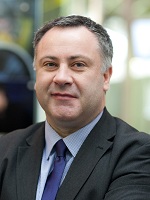WMG News
From molecule to manufacture…
 Inspired by the materials that helped astronauts survive Apollo 11’s mission to the moon, Professor Tony McNally has focused his career on developing new composites based on nano materials. WMG’s Professor McNally, who is based at the International Institute for Nanocomposites Manufacturing (IINM), was recently interviewed for Reinforced Plastics (www.reinforcedplastics.com), below is a snapshot of his thoughts on the challenges facing his research field.
Inspired by the materials that helped astronauts survive Apollo 11’s mission to the moon, Professor Tony McNally has focused his career on developing new composites based on nano materials. WMG’s Professor McNally, who is based at the International Institute for Nanocomposites Manufacturing (IINM), was recently interviewed for Reinforced Plastics (www.reinforcedplastics.com), below is a snapshot of his thoughts on the challenges facing his research field.
While my research is rooted in fundamental engineering science, the target is functional composite materials that can be readily manufactured into products in high volumes.
Currently we have projects focusing on aspects of batteries, fuel cells biomedical devices, electronics, pharmaceutical technology, aerospace, automotive, security, packaging and wind energy. Our focus is functional materials that can be manufactured using high volume production methods. If we can address this challenge, applications will be numerous.
In IINM we have synthetic chemistry laboratories where we can synthesize polymers and nanoparticles (organic and inorganic based), functionalise these particles using different strategies, small-and-industry scale extrusion and compounding, micro-and injection moulding, compression moulding, 3D printing and extensive characterisation facilities. The scope of nanocomposites research is to develop nanomaterials and composites but also innovate the science and technology associated with the manufacture of devices and components, embedding tailored functionality and properties. Ultimately, we hope to achieve tangible outputs that will benefit society to be useful as well as interesting.
Chemists and physicists must engage more with polymer technologists and engineers. Funding agencies with and without government should have focused calls for manufacturing polymer nanocomposites. While the UK has internationally leading polymer chemistry groups, considerable investment in infrastructure in polymer processing and engineering laboratories is urgently required in the UK. Germany, France and Austria have addressed this, and the government of India has announced plans to increase the number of centres for polymer engineering and technology from 23 to 50 by the end of the decade.
Sign up to read Professor McNally’s interview here.
